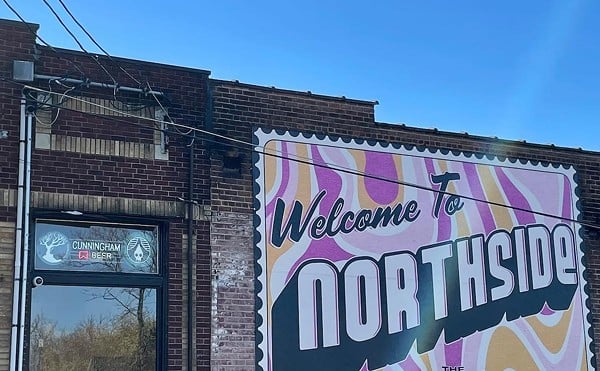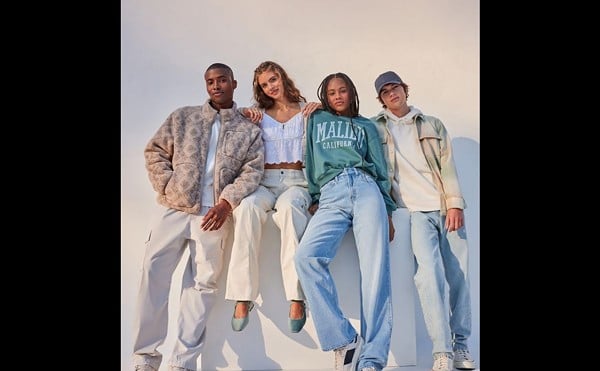|
In an industry filled with clichéd success stories, The Bronx stands as one of the few bands that have walked — and continue to pursue — a totally unique path. The L.A. quartet's members (vocalist Matt Caughthran, guitarist Joby Ford, bassist James Tweedy, drummer Jorma Vik) were longtime acquaintances and occasional bandmates through their various band affiliations in the SoCal Punk underground.
After assembling in 2002, the foursome recorded a demo in order to secure an opening gig on Dead Low Tide's Australian tour. In almost no time, their full throttle Hardcore-meets-Garage-Rock demo had attracted fans in the underground and tweaked radars among industry honchos. Subsequently, The Bronx's second show ever turned into an unintentional label showcase.
"It still doesn't make sense," Caughthran says with a laugh just before soundcheck at their recent headlining show at L.A.'s Roxy. "It was so weird because we were in the trenches for so long on individual levels in all our other bands. Playing shows where no one cares, no one shows up except one drunk guy at the bar and he heckles you. All of a sudden, we're playing the Troubadour and there's all kinds of people there and it's 'Don't screw up because there's a bunch of labels.' It was like, 'When did this all happen?'
It was a trip, but it ended up being really cool."
The Bronx found themselves in the midst of an old-fashioned label frenzy but with almost supernatural restraint fended off all offers in order to further develop as a band.
"Major labels prey on bands not having a plan and not knowing what to do and (who are) distracted by the glitz and the glamour of the whole process," Caughthran notes. "We knew exactly what we wanted and how we wanted to do it. Plus we had solid friends as managers and they told us, 'The way this works is the more money you take from them the more money they're gonna want from you. That means less control and less ability to be yourselves at a big level.' So that was the mindset going in. We don't want a lot of money — get a van, pay off some bills, let us disappear for a while and go play shows and we'll meet when it's time for the record."
As it happened, the label most willing to negotiate that deal was Island Def Jam, who allowed The Bronx to finish their nearly complete first album and release it themselves on their White Drugs imprint through Ferret Records. The first album wrapped up when former Guns N' Roses/soon-to-be Supernova guitarist Gilby Clarke became a Bronx fan through the friend-of-a-friend network and wound up producing four tracks on their debut.
After forging their sound on a relentless road circuit, The Bronx returned to track their self-titled major label debut with überproducer Michael Beinhorn. The album deftly captures The Bronx's hyperspeed Garage/Punk ethic and manic live energy, proving that their instinct to grow on tour was correct.
"There were more conscious decisions made on this record," Caughthran says. "On the first record, whatever songs we made, they were going out on the record. We didn't really know who we are — and to this day we still don't — but it was like, 'Here's the music we're making now.' With this record, there was a conscious effort to not make the first record again and focus on groove and push ourselves out of the comfort zone, to do things differently and take ourselves to a heightened, different place."
The Bronx's profile will get another exponential expansion with the upcoming release of What We Do Is Secret, the bio-pic film detailing the glorious rise and tragic end of the Germs, L.A.'s late '70s Punk darlings led by doomed vocalist Darby Crash. In the film, The Bronx will portray Hardcore contemporaries Black Flag in their pre-Henry Rollins configuration.
"It's been done for ages, man, but I don't know when it's coming out," Caughthran says. "I can't wait to see it. It was so much fun. We got to do the soundtrack with (ex-Germ) Pat Smear, and Kira (Roessler) from Black Flag came in and played bass; we recorded 'Police Story.' I'm a huge Black Flag fan, they were such a big band for me growing up. It was a dream come true."
Between the early label interest, the relentless tour schedule, the Germs film and the launch of their major label debut, Caughthran admits that things have been a little overwhelming for The Bronx.
"The first three years of this band was such a whirlwind," he says. "We have a record, and before you know it we're signed to a major label and then it's, 'Oh shit, we've been on tour for a year and a half and we've been around the world ... what the fuck just happened?' But it's so great, because it gives you such confidence in your ability to create and make music. After finishing the second record, we feel even better. We're super proud of ourselves and ready to go out and tour as much as we have to."
When it comes to The Bronx's sound and vision, Caughthran expresses a mature perspective for such a young man so new to the bigger gameboard he and his band are about to be playing on.
"The older I get and the more I think about music and art and creativity, the more I respect longevity in music," he says. "There's something great about a quick flash and getting in and getting out and just fucking things up for a minute. But I really want ... The Bronx be one of those bands that is able to continue to push ourselves and the music we make over an extended period of time and not sacrifice anything that we wouldn't have sacrificed from day one.
"There are so many people who do that, people like Neil Young and bands like Sonic Youth. That's the thing that's been on my mind lately, always remembering why you love music and why you started to sing and play and write and to always keep that spirit going."
THE BRONX play Bogart's Saturday with Mastodon.





